#la scala theatre
Text
Today's St. Ambrose, patron of Milan, and as per tradition is also the day on which La Scala's season opens.

Double Duck - Prima della Prima (2008)
Originally called "Nuovo Regio Ducal Teatro Alla Scala" (New Royal Ducal Alla Scala Theatre), it was inaugurated on 3rd August 1778 after the old Ducal Theatre was completely destroyed by a fire. To make space for the new building, the church of Santa Maria alla Scala was demolished and the new theatre built in its place (hence the name).
Alla Scala Theatre is the main italian opera theatre and one of the most illustrious in the world.

Topolino #2767 cover
For many years now, the season opening of La Scala is broadcasted live on national tv main channel (yes, we get 3 hours non stop opera on the state tv channel 1... so what?), this year's gonna be "Boris Godunov"... and I've gotta go 'cause it's starting!!! :D

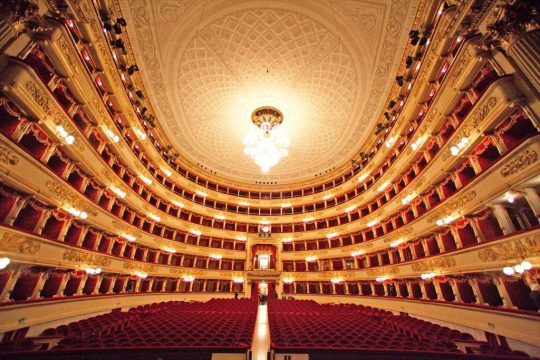
#la scala#prima#la scala seaso opening#donald duck#double duck#milan#st. ambrose#la scala theatre#topolino magazine#boris godunov
22 notes
·
View notes
Text
Highlight of the Day - 03.08.2024
Apart from the hot summer and the peak of holiday season, the world is abuzz with lots of developments. As the last 24 hours were full of several important news, we chose to share 3 current highlights for today.
Kamala Harris the to-be-Democratic-Nominee for President of USA
The highlight news of today is that Vice President Kamala Harris was able to collect enough Democratic Party delegate…
#Actuality#Aerosmith Retires#Agenda 47#Amusement Park History#Brad Whitford#Cultural Milestones#Donald Trump#Dream on song#Elon Musk Legal Battle#Entertainment Updates#Harris vs trump#highlights of the day#Historic Events#Italy#Joe Biden#Joe Perry#Joey Kramer#Kamala Harris 2024#La Scala Theatre#learning by history#Legal News#Music Legends#Musical hits#Peace Out tour#Performing Arts History#Political News#President of USA#Project 2025#Rock And Roll Farewell#rock legends
0 notes
Text
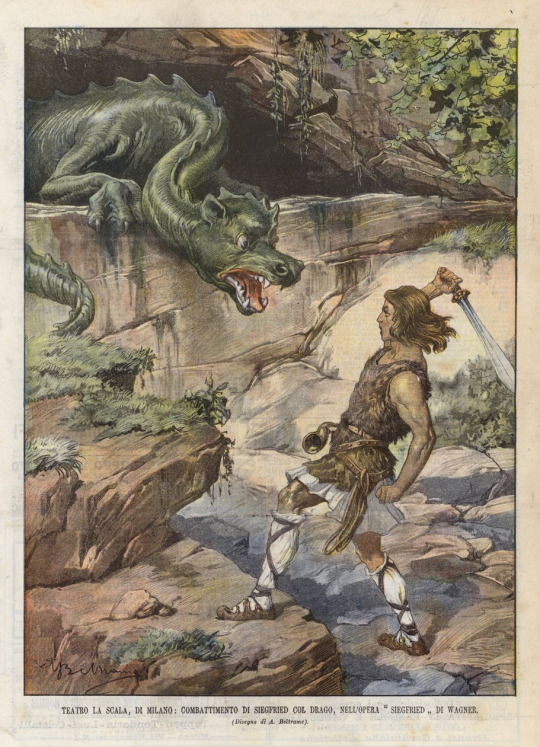
Siegfried Fighting with the Dragon by Achille Beltrame
#siegfried#dragon#art#achille beltrame#fafnir#fafner#dragons#richard wagner#milan#theatre#la scala#opera#der ring des nibelungen#the ring of the nibelung#german#germany#germanic heroic legend#norse mythology#germanic mythology#nibelungenlied#fáfnir#europe#european#mythical creatures#sword#gram#nothung#balmung#völsunga saga#sigurd
129 notes
·
View notes
Text

Jorge Grau | La Scala Theatre Ballet School (Scuola di Ballo del Teatro alla Scala)
#jorge grau#la scala theatre ballet school#scuola di ballo del teatro alla scala#balletphotography#ballet slippers
24 notes
·
View notes
Photo

Domenico Di Cristo and members of the La Scala Theatre Ballet - Teatro alla Scala
#domenico di cristo#teatro alla scala#italian ballet dancers#ballerina#ballerino#dancer#danseur#bailarín#boys of ballet#ballet men#dance#ballet#la scala theatre ballet
188 notes
·
View notes
Text



The costumes inside laboratories of Teatro alla Scala/La Scala, Milan
[taken by Molteni Motta in 2013]
#costumes for don carlo extras in the second pic dawg ... watch me steal all these#theatre#la scala#costume#clothes#opera#*
17 notes
·
View notes
Text

How to Become a Successful Singer
HINTS ON THE CULTIVATION OF THE VOICE.
By ENRICO CARUSO.
It has often struck me, in a lengthy experience as a singer, that there is one point in particular about the human voice which is far too little appreciated by the rising generation of aspiring vocalists, and that is its wonderful reciprocity. Tend it, nurse it, "feed it on a proper diet," and it will invariably comport itself in the most amiable manner possible. But neglect it, treat it as an organ which is best left to look after itself, and the voice will at once, in revenge for this callous behaviour, retaliate by behaving itself in a manner which is perhaps best described as of the "hooliganistic" order.
And yet, as an actual fact, but a very small percentage indeed of would-be singers ever really seem to think it worth their while to bear in mind this axiom, for axiom it surely is, that the voice requires proper care and proper exercise to keep it in its best form just as much as is a certain amount of exercise necessary to the maintenance of good health in every human being.
Unfortunately, however, there would seem to be a prevalent impression among many amateur and not a few professional singers that singing is an art which can be acquired in quite a short time. Thus, is it not curious that while many students of the piano or the violin will willingly devote years of strenuous and conscientious practice to the study of the technique of these instruments, would-be singers frequently seem to expect to learn how to use their voice to the best advantage after a period of vocal practice extending, maybe, over a year or so, but more often even over only a few months? This policy, I need scarcely remark, is absolutely ruinous to the future careers of young singers, for no matter how naturally talented any individual vocalist may be, he or she cannot possibly produce the best results as a singer unless the particular organs brought into play in the process of singing have been subjected to a proper and sufficiently long course of training. Since the days of the old Italian masters there can be no shadow of doubt that, musically, we have advanced considerably; but sometimes, when I think of the rather slipshod methods of cultivating the voice advocated by many so-called "professors" to-day, the thought impresses itself on my mind that the detailed principles of the old Italian masters who, above all other considerations, insisted on a long course of voice training as being the only possible means to the attainment of the best art, possessed more to recommend them than do many of the modern "artifices" of voice-cultivation proffered by many teachers of singing to-day.
In a short article, of course, it is obviously impossible to go in detail into all the rules which should be observed by singers who are prepared to undertake the task of cultivating their voices on a conscientious and sound basis. At the same time, I hope to be able to suggest various hints and wrinkles which should prove of real value to aspiring singers.
In the first place, therefore, let me say at once that it is the most fatal of all errors for a singer to make too much use of the voice, for the muscles of the larynx are so delicate that they cannot possibly stand the strain of the "learn-to-sing-in-a-hurry" methods of those who hope to attain the highest point of proficiency without devoting sufficient time to that "drudgery" which is absolutely essential to the real and perfect cultivation of the voice.
For this all-important reason I would counsel singers to see to it at all times that in the early days of their training they do not devote too much time to practice. If they will take my advice, until they become thoroughly proficient in "managing" the voice—a happy state of affairs which can only be acquired after long practice—they will at first never devote more than fifteen minutes a day—in the early morning is, perhaps, the best time—to practice. I can readily realise that this must seem a very short time to enthusiasts who are willing to give up all their spare time to the study of voice cultivation, but it is, nevertheless, quite long enough, for the slightest strain put upon the voice may retard a singer's progress by months, while, on the other hand, as I pointed out at the beginning of this article, if the singer will only bear in mind that the voice requires the most careful "nursing" of perhaps all the organs, and must on no account be strained, he will soon find that, though he may not be aware of any improvement in it, his voice is, nevertheless, slowly but surely improving and gaining in strength through his gradually-growing knowledge of technique.
Another point in the cultivation of the voice which I often think is not sufficiently strongly emphasised to-day is the fact that young singers can improve their methods in the most extraordinarily rapid manner by studying the methods of other and more experienced singers. In singing, as in the cultivation of the other arts, in time the student will get what he works for, but it is surely unreasonable for him to expect to sing effectively by his own inspiration. He will be wise, therefore, to seize every opportunity of studying as closely as possible the methods of those who have thoroughly mastered the technique of singing. For true art, of course, there must be more than technique, but I would point out that in singing there is no art without sound methods of execution, which, after all, to all intents and purposes constitute technique. In the cultivation of expression, technique, and sympathy in the voice, there is no better teacher than "a visit to the opera." Still, I make no doubt that of the hundreds of aspiring singers who visit the opera during the season but very few indeed would care to go through the years of drudgery as conscientiously as have those who seem to sing so easily and to combine the art of acting and singing at the same time with equal facility. After all, the highest art lies in the concealment of that art, and I take it that it is because a really proficient opera singer accomplishes his performance with such apparent ease that the difficulties of operatic singing are so little appreciated.
Still, as I have said, I am strongly of the opinion that young singers can learn much from studying the methods of operatic vocalists, that is to say, when they have mastered the rudiments of voice cultivation, into which I need not enter here, for my object is rather to show singers various methods by which they can attain the highest art when they have served a sufficient apprenticeship under masters whose duty it is to teach them the elementary rules of singing.
For my own part, I find that a singer's life, with its constant rehearsals and performances, is such a busy one that not much opportunity is allowed him for indulging in outdoor exercise. Many other enthusiastic singers doubtless find themselves situated in very similar straits, not perhaps on account of their public engagements, but through the "calls" made upon their time by business, social, or domestic duties. In the cultivation of the voice, however, a certain amount of exercise is essential to good health, as, by the same token, is good health a sine quâ non to the attainment of the highest art in singing. It may be of service, therefore, if I explain the rules I observe when I find the calls upon my time too numerous to enable me to get as much exercise as I should otherwise like.
No matter how busy I am, when I rise in the morning I invariably indulge in a few simple physical exercises, similar in character to those I used to practise when, as a young man, the time came for me to serve my king and country as a soldato, or, if I feel that these are becoming monotonous, for a few minutes I find practice with a pair of dumb-bells—not too heavy, by the way—very beneficial. But save these mild forms of relaxation I have, as a rule, to rest content with, in the way of outdoor exercise, an occasional motor drive. Nevertheless, I would point out that, in itself, singing, with its constant deep inhalation, is by no means inconsiderable exercise, though, to be sure, I am well aware that it cannot be so health-giving in its effects as actual exercise in the open air.
Yes, past a doubt, young singers can learn much about the highest art of the cultivation of the voice from watching the knowledge of technique of our best operatic artists, and from observing their methods of "managing" the voice. Still, to thoroughly grasp the progress of the opera-singer's art, it will be necessary for students to appreciate the fact that Italian singing has had two important culminating periods, each of which was illustrated by a group of great singers, the first of which was made up of pupils of Bernacchi, Pistocchi, Francesca Cuzzoni, and other contemporary teachers. These great singers brought the art of bel canto to as near a state of perfection as has ever been known. But one has to remember the conditions under which they sang.
Thus Victor Maurel writes:—"In the days of the schools of the art of bel canto the masters did not have to take truth for expression (l'expression juste) into account, for the singer was not required to render the sentiments of the dramatis personæ with verisimilitude; all that was demanded of him was harmonious sounds, the bel canto." In other words, all that the singer had to do was to sing, for the emotions themselves had not to be portrayed, the psychical character of the dramatis personæ not being taken into account.
In consequence, the perfection of the singer's voice was but slightly interfered with, as, at most, he had little or no acting to do, a conventional oratorical gesture or two being considered quite sufficient for the fashion of the period. And it is scarcely necessary to remark that the great singers of this period were skilful enough musicians to prevent such unimportant gestures, which hardly deserve the dignity of the name of acting, from being an obstacle to the high quality of their singing.
In the second period of Italian singing, however, the period which coincides with the Rossini-Donizetti-Bellini period of opera in its heydey, the conditions, we find, were greatly altered. The music at this time was at once more dramatic and more scenic, and although the singing was still bel canto, the opera singer of the period was called upon not only to sing well, but to sing dramatically, though it must be said that the music itself provided larger scope for the actor's art, in that it gave more favourable opportunity for specialising and differentiating the emotions.
In "The Opera Past and Present" we find the following intensely interesting allusion to these two great culminating periods of Italian singing:—"A comparison of these two periods of Italian singing indicates the direction matters have taken with the opera singer from Handel's time to our own. From then to now he has had to face an ever-increasing accumulation of untoward conditions; his professional work has become more and more complicated. From Rossini's time down to this the purely musical difficulties he has had to face have been constantly on the increase—complexity of musical structure, rhythmic complications, hazardous intonations.
"He has to fight against the more and more brilliant style of instrumentation, often pushed to a point where the greatest stress of vocal effort is required of him to make himself heard above the orchestral din; more and better acting is demanded of him, he finds the vague generalities of histrionism no longer of avail; for these must make way for a highly specialised, real-seeming dramatic impersonation; intellectually and physically his task has been doubled and trebled. Above all, the sheer nervous tension of situations and music has so increased as to make due self-control on his part less easy. The opera singer's position to-day is verily no joke; he has to face and conquer difficulties such as the great bel cantists of the Handel period never dreamt of."
It has ever been my contention that the conscientious artist should carefully read and re-read the whole libretto, so as to inform himself of the poet's purpose and meaning in the construction and development of the plot, as well as to ever bear in mind his conception of the composer's idea of how the poetry and the various aspects of mind of the characters should be aptly and effectively musicked and interpreted so as to awaken a kindred, or appreciative, feeling in the minds of his hearers.
Besides this, the opera singer who aspires to rise to great heights must possess a keen nervous susceptibility, for only a man or woman of high nervous temperament can reasonably hope to succeed as a lyrico-dramatic artist. Again, in the great operas a most severe strain is placed upon the leading singers, for while they are portraying various emotions—-Love, Hate, Rage, or Laughter—they have, at the same time, to watch the conductor with most minute care lest they fail in time and rhythm.
In fine, though I think but few other than really conscientious students of singing entirely appreciate the fact, the opera-singer of to-day is called upon to possess a far greater knowledge of vocal technique than was ever demanded of him before in the history of singing, as those "good and golden days"—golden only to the moderate performer with but little ambition—when the singer who perhaps scarcely knew more than a few notes of music could, nevertheless, still arouse the plaudits of the public are gone—never to return.
I hope, by the way, that it will not be thought that I have entered too technically into the requirements demanded from an aspirant to operatic fame to-day. I scarcely think, however, that I can have done so, for I feel sure every really aspiring vocalist would prefer to know the exact heights to which he must cultivate his voice either on the operatic stage or concert platform, or even for the drawing-room, that is to say, if he is ever to make a great name for himself in preference to resting content to remain one of the "moderates," of which the musical profession is altogether already too full, not because there is a lack of singers with good voices, but largely, as I have always maintained, because there is a far too prevalent tendency amongst singers these days to shirk the real hard work which must be accomplished before lasting success can be attained.
In conclusion, in order to allow singers' voices to develop in a satisfactory manner, let me counsel them never to attempt those selections in public the range of which taxes and strains them to the utmost, for when a singer "exceeds" his proper range injury to the throat is always liable to follow. Better rather, therefore, is it that a song should be transposed to a lower key if a singer is determined to attempt it than that the voice should be unduly taxed.
And now I will say addio, though I would add that it is my sincere hope that some of the few hints I have given on the cultivation of the voice and of the heights of excellence to which ambitious singers should aspire may prove of real value to those with sufficient pluck to face the task of studying the art of the cultivation of the voice in a really conscientious manner. Hard work accomplishes wonders where the voice is concerned. Let me, therefore, counsel singers never to despair of attaining a state as near to perfection as possible, for it is those who are most alive to their own imperfections who will assuredly "go farthest" in the singing world.
#classical music#opera#music history#bel canto#composer#classical composer#aria#classical studies#maestro#chest voice#Errico Caruso#Enrico Caruso#lyric tenor#dramatic tenor#Metropolitan Opera#Met#La Scala#Bolshoi Theatre#Mariinsky Theatre#classical muscian#classical musicians#classical history#opera history#history of music#history#musician#musicias#diva#tenor#The King of Tenors
11 notes
·
View notes
Text
Full Length Ballet Performances
Cinderella
Instituto Nacional De Las Bellas Artes 🩰 Russian National Ballet
Coppelia
Paris Opera Ballet 🩰 Bolshoi Ballet Theatre
Don Quixote
The National Ballet Theatre of Ukraine 🩰Teatro alla Scala di Milano Marrinsky Theatre
Giselle
Bolshoi Ballet Theatre 🩰 Polish National Ballet 🩰 The Royal Danish Ballet 🩰 National Opera and Ballet Theatre of Mari El
La Bayadère
National Opera and Ballet Theatre of Mari El.🩰 Bolshoi Ballet Theatre
La Fille Mal Gardée
Serbian National Ballet
La Sylphide
The Royal Danish Ballet
Marguerite & Armand
The Royal Ballet
Mayerling
Stainslavsky Ballet
Nutcracker
The New York City Ballet 🩰Marrinsky Theatre 🩰 National Opera and Ballet Theatre of Marie.El
Romeo and Juliet
Ural Opera Ballet🩰 Bolshoi Ballet Theatre
Swan Lake
Kirkov Ballet 🩰 St Petersburg Ballet Theatre 🩰 American Ballet Theatre 🩰 Bolshoi Ballet Theatre
The Sleeping Beauty
Staatsballett Berlin 🩰 National Opera and Ballet Theatre of Mari El 🩰 Marrinsky Theatre 🩰 l'Opéra Bastille 🩰Teatro alla Scala 🩰 Bolshoi Ballet Act 1 Bolshoi Ballet Act 2
The Rite of Spring (Le sacre du printemps)
Marrinsky Theatre
I was born in the correct generation because I loved those photos so much, I decided to look up the ballet so I could watch it and there it was ! I have added other full length performances as well and for most of the pieces I have added different ballet companies (if I could find) just because different ballet companies means different choreography ( not always but certain companies are reowned for their distinct style)
Enjoy!
xo Daphne
4K notes
·
View notes
Text

Umberto Brunelleschi, Woman in Sheer Dress with Bird of Paradise, 1920's
Umberto Brunelleschi (1879 - 1949) was born in Italy, but moved to France in 1900, where he became a printer, book illustrator, and set and costume designer. He contributed to several French fashion magazines, such as Journal des Dames et des Modes, Gazette du Bon Ton, and Les Feuilles d'Art. Between the two world wars he worked on set and costume designs for several theaters, including Folies Bergère in Paris, the Roxy Theatre in New York, and La Scala in Milan. Some of the books he illustrated are Candide (Voltaire), Contes du temps jadis (Charles Perrault), and Les Masques et les Personnages de la Comedie Italienne. Towards the end of his life he also did a number of erotica illustrations. (x)
#Umberto Brunelleschi#art deco#illustration#1920s#bird of papradise#sheer dress#book illustration#vintage#1920s illustrations#art#brunelleschi#fashion illustration#painting#risque#birds-of-paradise#art deco design#art deco illustration
289 notes
·
View notes
Text
Prompt: Theatre (August 29) and Italy (August 30) from @into-the-jeggyverse
Word count: 435 words
Pairing: Jegulus (modern AU - genderfluid Regulus)
⚠️ Warnings: none
James was still in shock. He couldn't understand how Regulus managed to get tickets in the first rows at La Scala, the most beautiful theater in the world. Not only that, but it was also the most acclaimed show of the year. James bought himself a new tuxedo just for this occasion.
When they started dating, James revealed to Regulus that one of his biggest wishes was to go to Italy to see a show at La Scala. Regulus' great wish was a little simpler: to see Michelangelo's "David" in Florence. After four years together, the two simultaneously came up with the idea of fulfilling the other's wish. It had been a mutual surprise for their four year anniversary. James bought the tickets for Italy, Regulus secured invitations to La Scala. First they were going to see the show in Milan, and tomorrow morning they were going to leave for Florence.
James was arranging his bow tie in front of the mirror when he heard the bedroom door open, followed by a subtle and pleasant sound of heels. He turned his head and smiled when Regulus appeared in the hall, wearing a black dress with long sleeves, a wide skirt and gloves, similar to Dior dresses from the 50's. They also had a pair of green heels, matching with the necklace around their neck and their red lips.
"How do I look?" Regulus asked, and with audible emotions in their tone.
Ever since Regulus had discovered the complexity surrounding the idea of gender, they tried to find a way to express themselves in their complete truth. It was a long way to go, especially because of the way they were raised. Every time they felt the need to express their feminine side, Walburga's voice echoed in their head. Beside hers, however, there is another voice, a warmer one that supports and accepts.
"You're gorgeous, Regulus" James said and approached his partner to give them a kiss. "This dress fits you so well, I was right when I told you that you should buy it".
Regulus smiled and went to get their coat so they could leave. James looked at them from behind with eyes full of love. He couldn't wait to leave for Florence tomorrow. He had the ring ready for a year, and the plan was absolutely perfect. James would ask Regulus to marry him with "David" as a witness, after which they would watch the whole city from Piazzale de Michelangelo. Both were possessed by a type of magic that only a country like Italy could awaken in someone.
#microfics#dailyprompt#marauders era#james potter#james x regulus#jeggyverse microfic#regulus black#jegulus#jegulus microfic#dead gay wizards
76 notes
·
View notes
Text
Opera on YouTube, Part 2
Le Nozze di Figaro (The Marriage of Figaro)
Glyndebourne Festival Opera, 1973 (Knut Skram, Ileana Cotrubas, Kiri Te Kanawa, Benjamin Luxon; conducted by John Pritchard; English subtitles)
Jean-Pierre Ponnelle studio film, 1976 (Hermann Prey, Mirella Freni, Kiri Te Kanawa, Dietrich Fischer-Dieskau; conducted by Karl Böhm; English subtitles) – Acts I and II, Acts III and IV
Tokyo National Theatre, 1980 (Hermann Prey, Lucia Popp, Gundula Janowitz, Bernd Weikl; conducted by Karl Böhm; Japanese subtitles)
Théâtre du Châtelet, 1993 (Bryn Terfel, Alison Hagley, Hillevi Martinpelto, Rodney Gilfry; conducted by John Eliot Gardiner; Italian subtitles)
Glyndebourne Festival Opera, 1994 (Gerald Finley, Alison Hagley, Renée Fleming, Andreas Schmidt; conducted by Bernard Haitink; English subtitles)
Zürich Opera House, 1996 (Carlos Chaussón, Isabel Rey, Eva Mei, Rodney Gilfry; conducted by Nikolaus Harnoncourt; English subtitles)
Berlin State Opera, 2005 (Lauri Vasar, Anna Prohaska, Dorothea Röschmann, Ildebrando d'Arcangelo; conducted by Gustavo Dudamel; French subtitles)
Salzburg Festival, 2006 (Ildebrando d'Arcangelo, Anna Netrebko, Dorothea Röschmann, Bo Skovhus; conducted by Nikolas Harnoncourt; English subtitles) – Acts I and II, Acts III and IV
Teatro all Scala, 2006 (Ildebrando d'Arcangelo, Diana Damrau, Marcella Orasatti Talamanca, Pietro Spagnoli; conducted by Gérard Korsten; English and Italian subtitles)
Salzburg Festival, 2015 (Adam Plachetka, Martina Janková, Anett Fritsch, Luca Pisaroni; conducted by Dan Ettinger; no subtitles)
Tosca
Carmine Gallone studio film, 1956 (Franca Duval dubbed by Maria Caniglia, Franco Corelli, Afro Poli dubbed by Giangiacomo Guelfi; conducted by Oliviero de Fabritiis; no subtitles)
Gianfranco de Bosio film, 1976 (Raina Kabaivanska, Plácido Domingo, Sherrill Milnes; conducted by Bruno Bartoletti; English subtitles)
Metropolitan Opera, 1978 (Shirley Verrett, Luciano Pavarotti, Cornell MacNeil; conducted by James Conlon; no subtitles)
Arena di Verona, 1984 (Eva Marton, Jaume Aragall, Ingvar Wixell; conducted by Daniel Oren; no subtitles)
Teatro Real de Madrid, 2004 (Daniela Dessí, Fabio Armiliato, Ruggero Raimondi; conducted by Maurizio Benini; English subtitles)
Royal Opera House, Covent Garden, 2011 (Angela Gheorghiu, Jonas Kaufmann, Bryn Terfel; conducted by Antonio Pappano; English subtitles)
Finnish National Opera, 2018 (Ausrinė Stundytė, Andrea Carè, Tuomas Pursio; conducted by Patrick Fournillier; English subtitles)
Teatro alla Scala 2019 (Anna Netrebko, Francesco Meli, Luca Salsi; conducted by Riccardo Chailly; Hungarian subtitles)
Vienna State Opera, 2019 (Sondra Radvanovsky, Piotr Beczala, Thomas Hampson; conducted by Marco Armiliato; English subtitles)
Ópera de las Palmas, 2024 (Erika Grimaldi, Piotr Beczala, George Gagnidze; conducted by Ramón Tebar; no subtitles)
Don Giovanni
Salzburg Festival, 1954 (Cesare Siepi, Otto Edelmann, Elisabeth Grümmer, Lisa della Casa; conducted by Wilhelm Furtwängler; English subtitles)
Giacomo Vaccari studio film, 1960 (Mario Petri, Sesto Bruscantini, Teresa Stich-Randall, Leyla Gencer; conducted by Francesco Molinari-Pradelli; no subtitles)
Salzburg Festival, 1987 (Samuel Ramey, Ferruccio Furlanetto, Anna Tomowa-Sintow, Julia Varady; conducted by Herbert von Karajan; no subtitles)
Teatro alla Scala, 1987 (Thomas Allen, Claudio Desderi, Edita Gruberova, Ann Murray; conducted by Riccardo Muti; English subtitles)
Peter Sellars studio film, 1990 (Eugene Perry, Herbert Perry, Dominique Labelle, Lorraine Hunt Lieberson; conducted by Craig Smith; English subtitles)
Teatro Comunale di Ferrara, 1997 (Simon Keenlyside, Bryn Terfel, Carmela Remigio, Anna Caterina Antonacci; conducted by Claudio Abbado; no subtitles) – Act I, Act II
Zürich Opera, 2000 (Rodney Gilfry, László Polgár, Isabel Rey, Cecilia Bartoli; conducted by Nikolaus Harnoncourt; English subtitles)
Festival Aix-en-Provence, 2002 (Peter Mattei, Gilles Cachemaille, Alexandra Deshorties, Mirielle Delunsch; conducted by Daniel Harding; no subtitles)
Teatro Real de Madrid, 2006 (Carlos Álvarez, Lorenzo Regazzo, Maria Bayo, Sonia Ganassi; conducted by Victor Pablo Pérez; English subtitles)
Festival Aix-en-Provence, 2017 (Philippe Sly, Nahuel de Pierro, Eleonora Burratto, Isabel Leonard; conducted by Jérémie Rohrer; English subtitles)
Madama Butterfly
Mario Lanfranchi studio film, 1956 (Anna Moffo, Renato Cioni; conducted by Oliviero de Fabritiis; no subtitles)
Jean-Pierre Ponnelle studio film, 1974 (Mirella Freni, Plácido Domingo; conducted by Herbert von Karajan; English subtitles)
New York City Opera, 1982 (Judith Haddon, Jerry Hadley; conducted by Christopher Keene; English subtitles)
Frédéric Mitterand film, 1995 (Ying Huang, Richard Troxell; conducted by James Conlon; English subtitles)
Arena di Verona, 2004 (Fiorenza Cedolins, Marcello Giordani; conducted by Daniel Oren; Spanish subtitles)
Sferisterio Opera Festival, 2009 (Raffaela Angeletti, Massimiliano Pisapia; conducted by Daniele Callegari; no subtitles)
Vienna State Opera, 2017 (Maria José Siri, Murat Karahan; conducted by Jonathan Darlington; no subtitles)
Wichita Grand Opera, 2017 (Yunnie Park, Kirk Dougherty; conducted by Martin Mazik; English subtitles)
Teatro San Carlo, 2019 (Evgenia Muraveva, Saimir Pirgu; conducted by Gabriele Ferro; no subtitles)
Rennes Opera House, 2022 (Karah Son, Angelo Villari; conducted by Rudolf Piehlmayer; French subtitles)
#opera#complete performances#youtube#le nozze di figaro#the marriage of figaro#tosca#don giovanni#madama butterfly#madame butterfly#wolfgang amadeus mozart#giacomo puccini
60 notes
·
View notes
Text

On February 17, 1904, Giacomo Puccini’s opera Madame Butterfly premieres at the La Scala theatre in Milan, Italy. #OnThisDay
32 notes
·
View notes
Text
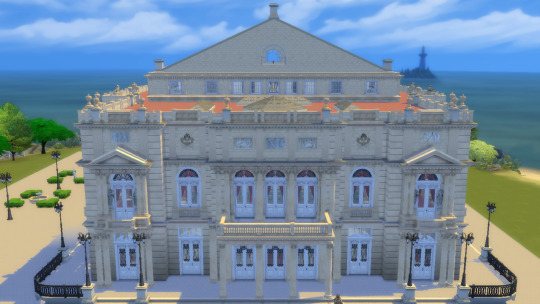
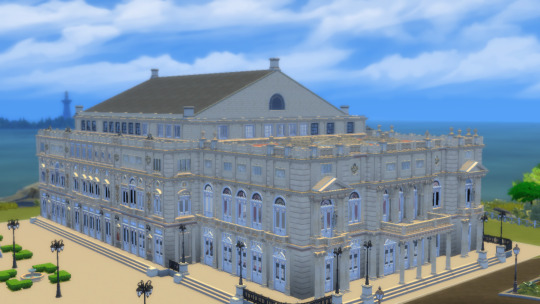


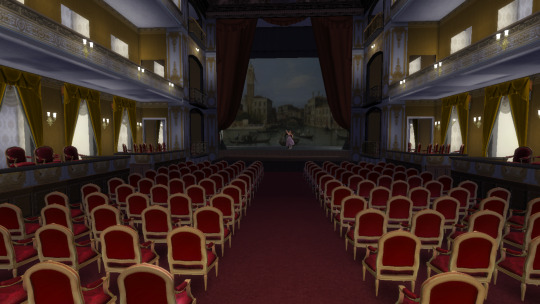
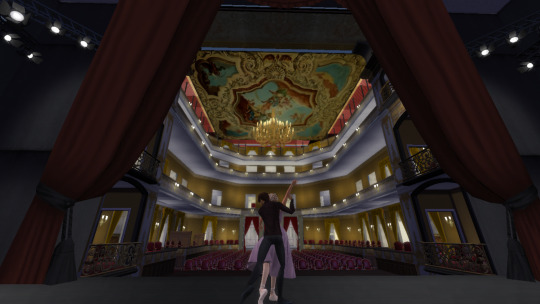
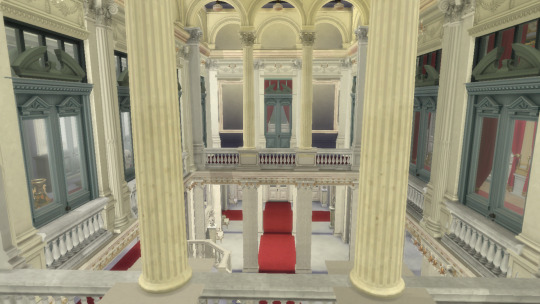
Colon Theatre
The Teatro Colón in Buenos Aires is one of the most important opera houses in the world. Its rich and prestigious history, as well as its exceptional acoustic and architectural conditions, place it on par with theaters such as La Scala in Milan, the Paris Opera, the Vienna State Opera, Covent Garden in London, and the Metropolitan Opera in New York.
In its first location, the Teatro Colón operated from 1857 to 1888 when it was closed for the construction of a new venue. The new theater was inaugurated on May 25, 1908, with a performance of Aida. Initially, the Colón hired foreign companies for its seasons, but starting in 1925, it had its own resident companies - Orchestra, Ballet, and Choir - as well as production workshops. This allowed the theater, by the 1930s, to organize its own seasons funded by the city's budget. Since then, the Teatro Colón has been defined as a seasonal theater or "stagione," capable of fully producing an entire production thanks to the professionalism of its specialized technical staff.
Throughout its history, no significant artist of the 20th century has failed to set foot on its stage. It is enough to mention singers such as Enrico Caruso, Claudia Muzio, Maria Callas, Régine Crespin, Birgit Nilsson, Plácido Domingo, Luciano Pavarotti, and dancers like Vaslav Nijinsky, Margot Fonteyn, Maia Plisetskaya, Rudolf Nureyev, and Mikhail Baryshnikov. Esteemed conductors such as Arturo Toscanini, Herbert von Karajan, Héctor Panizza, and Ferdinand Leitner, among many others, have also graced the theater. It is also common for composers, following the tradition initiated by Richard Strauss, Camille Saint-Saëns, Pietro Mascagni, and Ottorino Respighi, to come to the Teatro Colón to conduct or supervise the premieres of their own works.
Several top-notch maestros have worked consistently here, achieving high artistic goals. They include Erich Kleiber, Fritz Busch, stage directors like Margarita Wallmann or Ernst Poettgen, dance masters like Bronislava Nijinska or Tamara Grigorieva, and choral directors like Romano Gandolfi or Tullio Boni. Not to mention the numerous instrumental soloists, symphony orchestras, and chamber ensembles that have offered unforgettable performances on this stage throughout over a hundred years of sustained activity.
Finally, since 2010, the Teatro Colón has been showcased in a restored building, resplendent in all its original splendor, providing a distinguished setting for its presentations. For all these reasons, the Teatro Colón is a source of pride for Argentine culture and a center of reference for opera, dance, and classical music worldwide.
__________________________________________________________
You will need a 64x64 lot and the usual CC from TheJim, Felixandre, Harrie, Sverinka, SYB, Aggressivekittty, and other marvelous creators!
DOWNLOAD TRAY: https://www.patreon.com/user?u=75230453
(free to play 7/17)

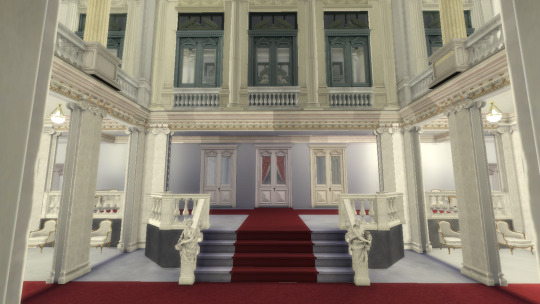
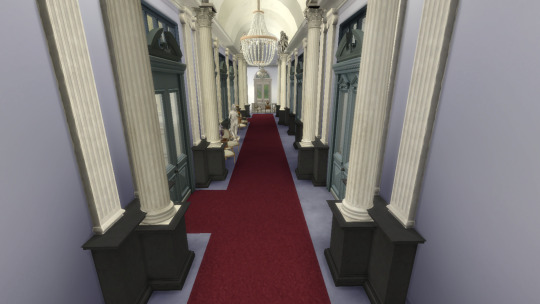
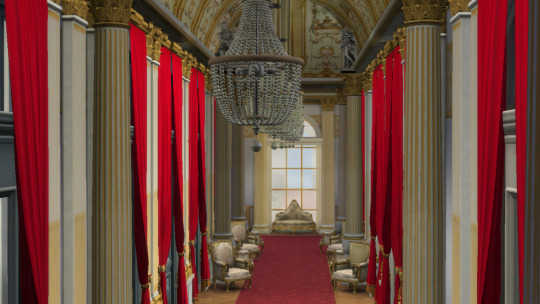


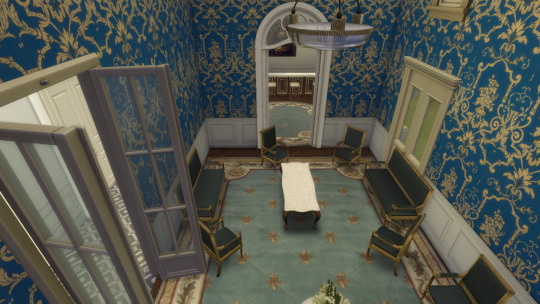
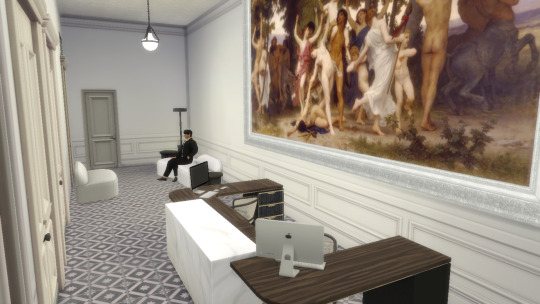




#sims 4 architecture#sims 4 build#sims4palace#sims 4 screenshots#sims4#sims4play#sims 4 historical#sims4building#sims 4 royalty#sims4frencharchitecture
73 notes
·
View notes
Note
S U N for the oc meme? 🥰
litcherally the cutest combo but i fear i have no u names so... u get two that start with s!
samantha 'sam' bailey - dbd - choreographer for the la scala theatre ballet in milan. she ended up bonding with her co-worker, camille, during her time there but that was... probably a mistake considering she's taken by the entity after being made to look like she pushed camille off the catwalk. in the realm, she's haunted by the loss of her friend and HUNTED by an old theatre legend camille had told her about when she'd started working with her. very altruistic in trials bc she's Highkey Guilty about it all and wants to do whatever she can to at least save SOMEONE even if the effort doesn't matter in the end bc there's always another trial. she's also deaf and uses hearing aids (small lil bit of projection but i just think its neat!)
zhuldyz aka star - vtm - my banu haqim for vtmb2. embrace date and sire unknown. the most she'll tell you about herself is she was born in kazakhstan and everything ELSE she says is entirely up to you to decide if it's true or not bc you Can't Be Knowing Her. obvi don't have much to go off of yet game-wise!
nazira akhmet - mk - the most overstimulated lil freak you'll ever meet like she is no clipping into the floor as we speak. she has heightened senses (and lightning fast reflexes to match) inherited from her father and his father before him and HIS father before him, but... something went Wrong with her bc she literally cannot be chill about it and she tends to go for the keep the mask on at all times route just to avoid a meltdown. she is an apothecary in her mountain village, working alongside her sister ayaru and her brother-in-law sekir, and also does emissary work for the edenian royal family since the akhmets have been loyal to them for centuries. mk11 timeline, she is a... bit more feral but at least can better tolerate her abilities. shipped with both syzoth (mk1) and jade (mk11) bc haha green
#asks#oc: sam bailey#oc: star#oc: nazira akhmet#ok so have u noticed a pattern with these asks bc i'm NOT normal about a certain game
7 notes
·
View notes
Text


Princess Grace and Prince Rainier of Monaco walking through the streets of Milan, Italy, on December 6, 1960. The princely couple were in the town to attend the La Scala theatre season opening with Maria Callas the day after.
11 notes
·
View notes
Photo
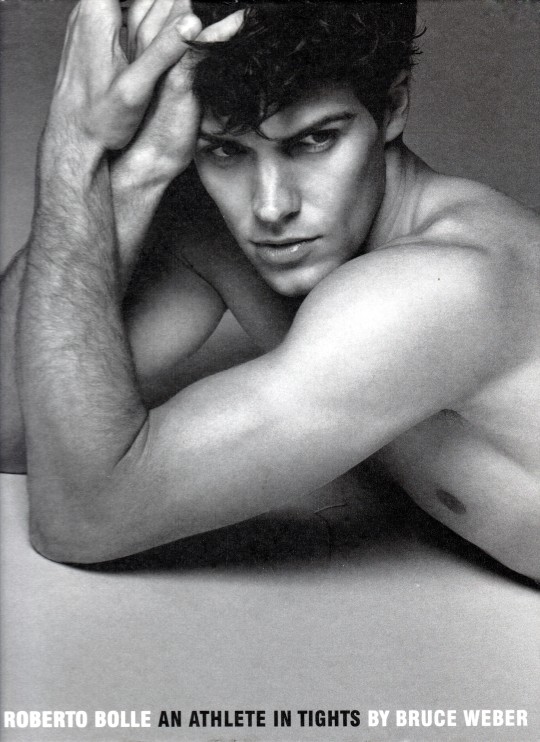
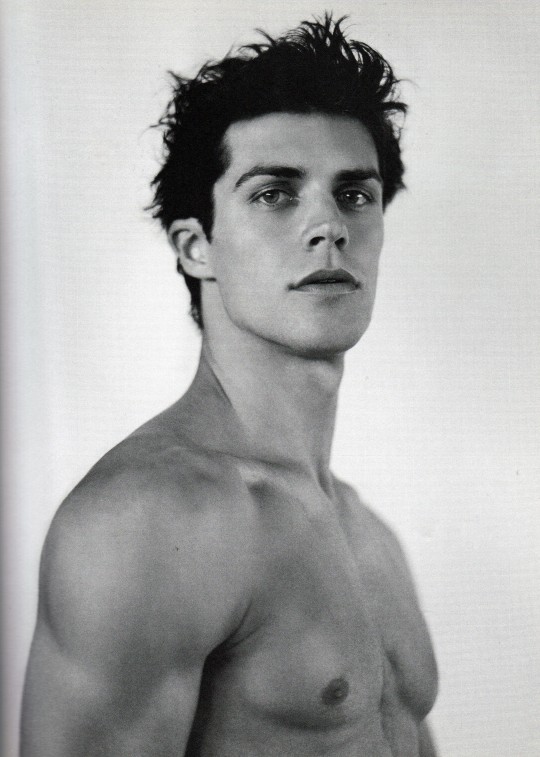
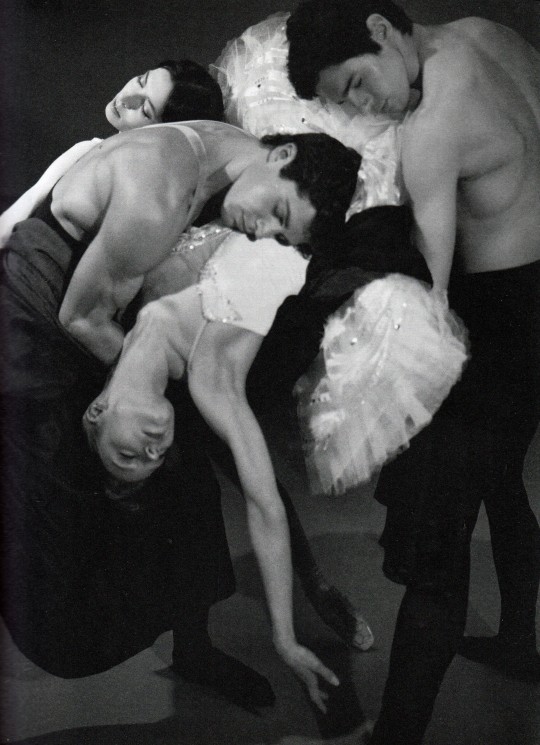
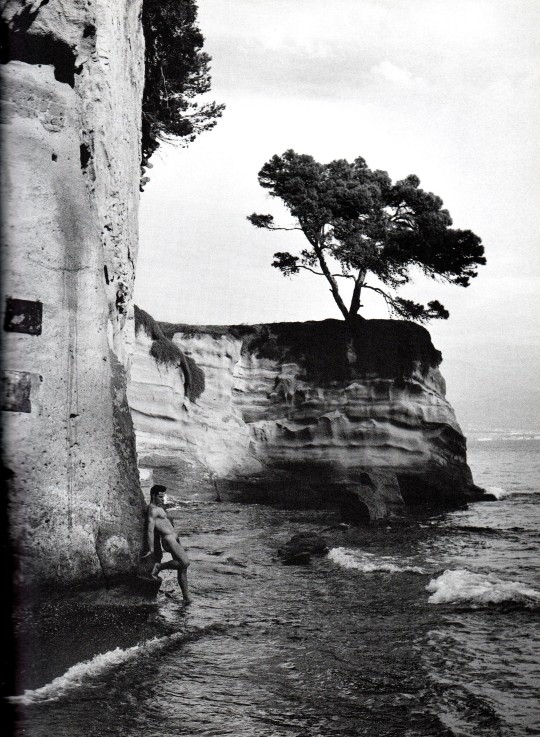
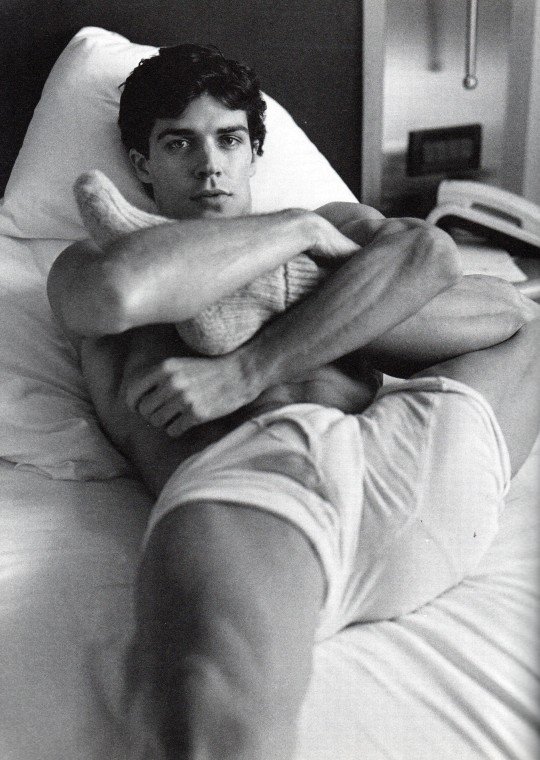
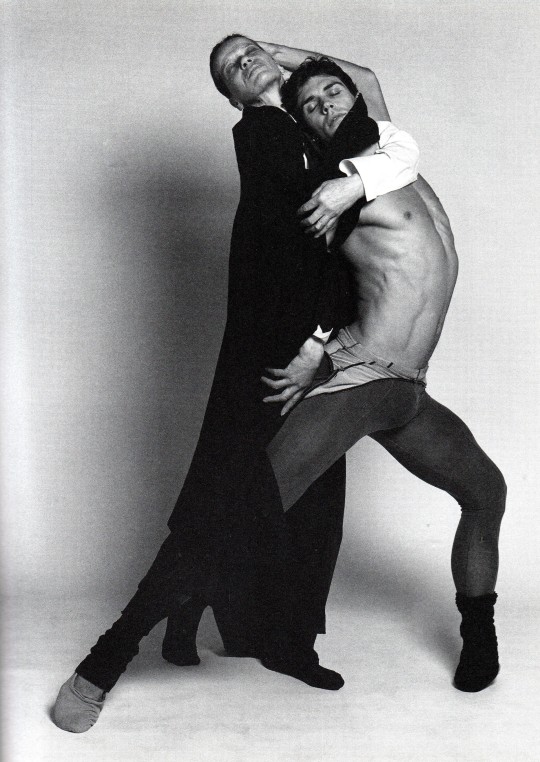
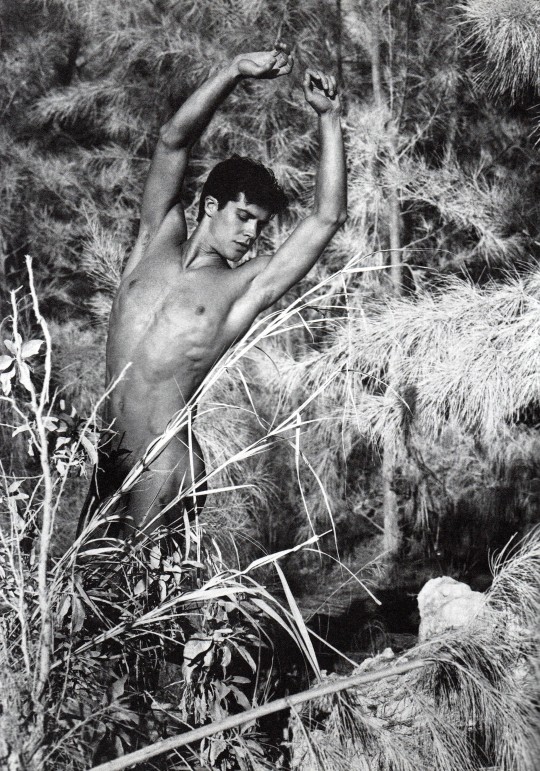
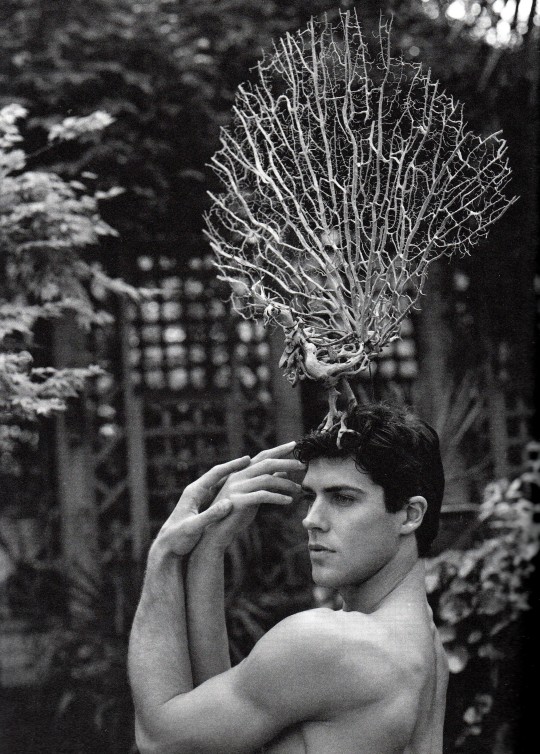
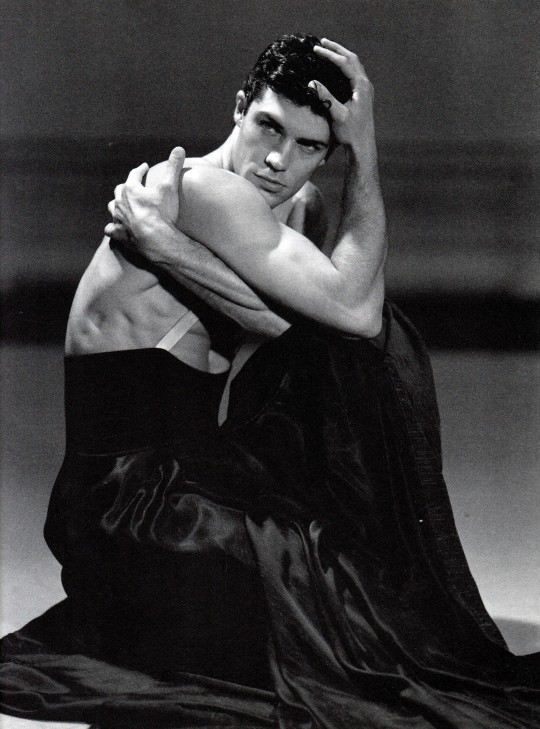
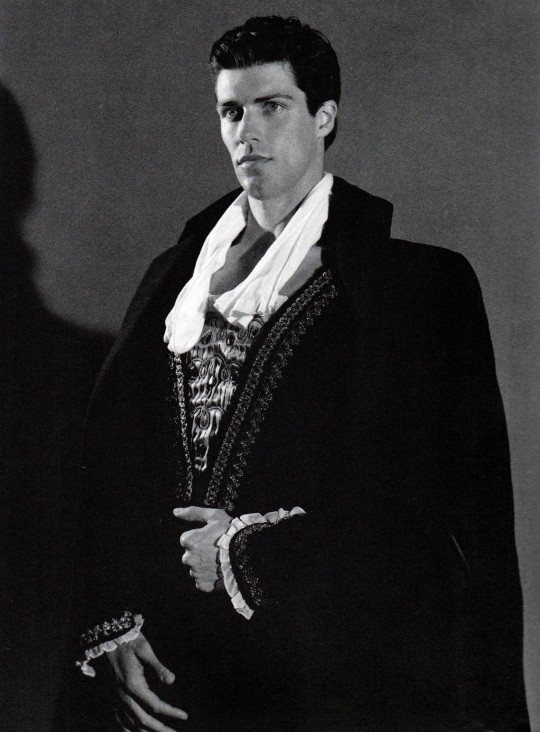
Roberto Bolle An Athlete in Tights
by Bruce Weber
teNeues, Kempen 2009, 192 pages, 127 duotone and 24 color illustrations,23,5 x 30 cm, ISBN 978-3-8327-9196-4, Out of Print book
euro 210,00
email if you want to buy [email protected]
“Roberto Bolle: An Athlete In Tights” celebrates Bruce’s three-year collaboration with the Italian ballet sensation.
Roberto Bolle was born in Casale Monferrato, Italy. At a young age, he entered the Theatre La Scala ballet school. Rudolf Nureyev was the first to notice his talent and chose Roberto to interpret Tadzio in the ballet “Death in Venice.” In 1996, at the end of a Romeo and Juliet performance and just 2 years after he joined the Theatre Company, Roberto was promoted to principal by Elisabetta Terabust who was at that time the Director of the Corp de Ballet. Since then he has starred in many contemporary and classical ballets and he has been invited as a guest artist to work with the most prestigious ballet companies in the world. In recent years, his international acclaim has only grown. Roberto is now the first male Italian ballet dancer to join the American Ballet Theatre as a principal.
In this monograph, Bruce Weber captures the spectacular convergence of artistry and physicality in this dance phenomenon, the grace and beauty that have captivated Roberto’s audiences around the world.
The book is largely pictorial in nature, with original photography and writing by Bruce Weber, original writing by Roberto Bolle, text by D.H. Lawrence, Pier Paolo Pasolini, and illustrations by Paul Cadmus and Jeremiah Goodman.
orders to: [email protected]
twitter: @fashionbooksmi
flickr: fashionbooksmilano
instagram: fashionbooksmilano
tumblr: fashionbooksmilano
10/02/23
#Bruce Weber#Roberto Bolle#athlete in tights#photography books#rare books#ballet dancer#dance phenomenon#fashionbooksmilano
80 notes
·
View notes